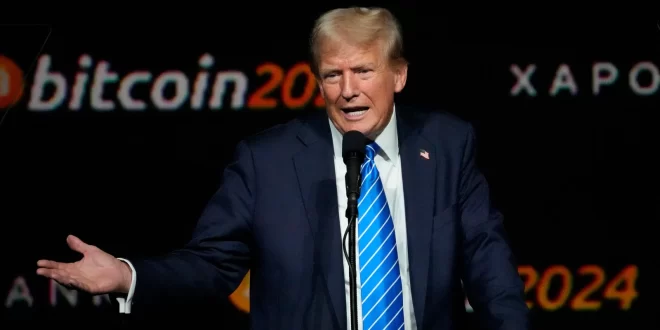Crypto Clarity on the Horizon: Trump’s 2025 Vision for Blockchain Regulation
Will Trump’s Return End Crypto’s Regulatory Chaos?
Breaking the Crypto ‘Gray Area’: What to Expect from Trump’s SEC
Tokenizing the Future: Can the U.S. Keep Up with Global Crypto Leaders?
CEOs, developers, and investors have been increasingly vocal about the U.S.’s failure to establish clear regulatory guidelines for cryptocurrency and blockchain technology. With the 2025 election bringing Donald Trump back to the presidency and SEC Chair Gary Gensler stepping down on inauguration day, many in the crypto community are asking: Will the SEC finally bring the clarity CEOs and investors have been desperately seeking?
Regulatory uncertainty is especially problematic for Real World Asset (RWA) projects, which involve tokenizing tangible goods like real estate, commodities, art, and energy. The absence of clear regulations from U.S. federal agencies has raised concerns about America’s position as a global leader in technology and finance. In the meantime, only the most risk-tolerant investors are engaging with decentralized finance (DeFi), a space often criticized for its lack of transparency. Corporate players, however, are staying away due to the fear of unknowingly dealing with bad actors, leaving the space feeling like the “wild west” of modern finance.
The regulatory landscape in the U.S. remains fragmented, with multiple agencies, including the SEC, Commodity Futures Trading Commission (CFTC), IRS, Financial Crimes Enforcement Network (FinCEN), and the Office of the Comptroller of the Currency (OCC), all claiming jurisdiction over different aspects of the crypto industry. This overlap in authority has created a “regulatory turf war.”
SEC Chair Gary Gensler has faced criticism for his aggressive enforcement actions against crypto participants, and President-elect Donald Trump has openly criticized him, pledging to remove him on his first day in office. However, Gensler’s resignation has already been set for the day Trump is sworn in, rendering Trump’s promise moot.
Hester Peirce, an SEC Commissioner known for criticizing Gensler’s approach, has expressed frustration with the current enforcement-driven approach. She believes it punishes innovation instead of fostering it. Many in the crypto world hope Peirce will take a more prominent role in leading the SEC towards clearer, more favorable regulations.
While the U.S. lags behind in regulatory clarity, other nations have quickly moved to implement clear guidelines for the crypto industry. Switzerland’s Financial Market Supervisory Authority (FINMA) has set straightforward rules for tokenized securities, while Singapore’s Monetary Authority of Singapore (MAS) offers detailed licensing regimes and regulatory sandboxes. The European Union’s Markets in Crypto-Assets (MiCA) regulation has unified crypto laws across its member states.
For RWA projects, the lack of U.S. regulatory clarity is a significant barrier. Tokenizing assets like real estate or art could unlock liquidity for owners, but the uncertain regulatory environment makes it difficult to operate domestically. Without clear rules, RWA issuers risk running afoul of securities laws, which increases compliance costs and discourages new entrants.
With Trump returning to the presidency, there is speculation about how his administration will approach crypto regulation. Trump has shown optimism toward blockchain technology, stating at the Bitcoin conference in Nashville, “If crypto is going to define the future, I want it mined, minted, and made in the USA.” This suggests that his administration could play a more proactive role in providing regulatory clarity. However, the speed at which this clarity will emerge remains uncertain.
J.D. Vance, Trump’s Vice President-elect, is a vocal supporter of crypto and has expressed strong views on its potential for economic growth. With the increasing importance of blockchain technology and tokenized assets in the global economy, the new administration could push for a more decisive stance on crypto regulation. Many industry leaders believe Trump’s pro-business stance could lead to policies that encourage innovation while maintaining sufficient oversight to protect investors.
2025 Crypto Forecast: DOGE, PEPE, and Yeti Ouro Ready for Explosive Growth
 Business Sandesh Indian Newspaper | Articles | Opinion Pieces | Research Studies | Findings & News | Sandesh News
Business Sandesh Indian Newspaper | Articles | Opinion Pieces | Research Studies | Findings & News | Sandesh News



